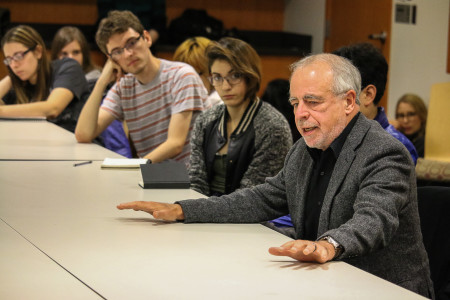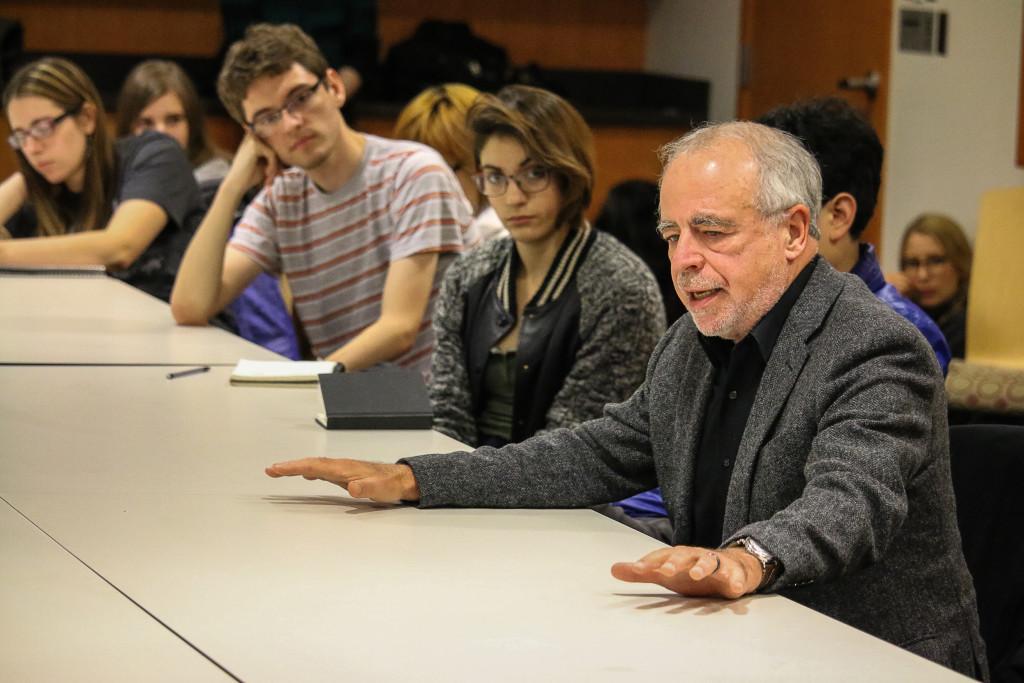Susanne Bushman, Arts Editor
bushmans@grinnell.edu
Writers@Grinnell hosted Pulitzer Prize-winning author Richard Russo yesterday, Nov. 12. Russo is the author of seven novels, a collection of short stories, a memoir and several screenplays.

Russo’s novels contain “the full sweep of the adult world,” as Professor Dean Bakopolous, English, stated in his introduction for the writer. During his reading, however, Russo seemed to speak directly to the students and aspiring writers in the audience by focusing on his transformation throughout his long academic career. Russo read from the autobiographical essay, “The Destiny Thief,” which dissects how he came to be a fiction writer rather than an academic.
“The Destiny Thief” was framed within his competition with a fellow student in an undergraduate writing workshop, in which he was enrolled at the beginning of his fiction writing career. His start in fiction began at the end of his work on his Ph.D. in Literature while he was working as a teaching assistant at the University of Arizona.
“Two things occurred to me, one of which was, of all the various disciplines that were represented in part of the English Department there, the only ones who seemed to be having fun were the creative writers,” Russo said during his roundtable discussion. “The other thing I noticed about [the creative writers] was that when they finished their workshops they all went out to the bar afterwards and they continued to talk about literature, these incredible, beer-fueled discussions of literature, poetry and fiction that went deep into the evening. Whereas my other Ph.D. candidates, the scholars … we had become the most insufferable drudges.”
Although he finished his Ph.D. dissertation, Russo abandoned academia and began writing fiction when he was supposed to be creating scholarship as a professor.
“Once I got the bug, once I got bit, I was addicted,” Russo said at the roundtable. “I finished the Ph.D. and then I started to get into trouble professionally because I was hired not as a fiction writer but as a scholar. … My first job was at a branch campus of Penn State University, where I was threatened almost weekly by my department chair who had somehow got wind of the fact that I wasn’t doing scholarship anymore.”
Russo’s career in fiction eventually took off, however, and he was able to give up scholarship entirely.
Russo’s fiction often calls upon his working class upbringing and looks at seemingly ordinary people in an extraordinary light. Learning to accept that his best work would call upon the working class identity he had tried to shed as a scholar represented a major turn in Russo’s career wherein he chose not to give up on his dream of being a writer. He came to embrace his background and the perspective it gave him.
“To become the writer that you ultimately will need to be, to be the best possible writer that you need to be, you have to know who and what you love. If you do that, you will be less likely to travel down false paths about material that is unlikely to sustain you because you’re working outside what I think of as the greatest sweet spot that you have as a writer, which is knowing who the most important people in your life are and why and whatever about your experience of living you treasure most,” Russo said in the Q&A following his reading.
He couples writing about characters that he loves with the humor he sees in the world, helping readers to see as he does.
“I never make anything funny. It’s just the way I see the world,” Russo said during the roundtable. “I think that writers are people who see things twice. You see the thing itself and then you see its value to you as a storyteller.”
Though Russo’s career has spanned many changes in the way we consume art, he still sees his work as having the same function it always has.
“I think art has always asked us to do the same thing, and it is still asking us to do it now. It’s just asking us more emphatically because it’s more important that we understand it now. I think that what art has always asked us to do is slow down,” Russo said in the Q&A. “Speed is officially king and I don’t know if we ever are going to turn the clock back on that, or even if we should, but art demands that we slow down, just as it always has. ”


































































